Treating still with so much sweet behaviour
Anita Brookner
A SILENT JOY by Elizabeth Jenkins Constable, 113.99, pp. 208 Elizabeth Jenkins, absent for far too long from our library shelves, makes a wel- come return with a new novel which reveals the same gentle and compassionate skills that faithful readers will remember from The Tortoise and the Hare and Honey. These dealt, in an extremely satisfactory Way, with good and bad behaviour, to Which the author responds with a keenness that is going slightly out of fashion. The Monstrous Blanche, in The Tortoise and the Hare, and the equally monstrous Honey, in the novel of that name, overwhelm the innocent creatures in their paths by the sheer force of their conviction. Morality, to them, is irrelevant: the only question they ask themselves is, 'Is this to my advantage?' The reader boils with indignation, and also With fear, for if this is the way the world is going (and what is a novel if not a world ?) then all is lost.
A Silent Joy is a much milder under- taking, and in many ways a more reassuring one. Certainly it boasts two aberrant Women, possibly three, but they create less anger and pose less of a threat than their Predecessors. Any man, one feels, could see them Off, as does Sir Geoffrey Galbraith, the hero, in every sense, of the present novel. This in itself is old- fashioned. For Elizabeth Jenkins it is always the woman who is at fault, Eve to the original Adam, and this is out of phase With current thinking. What comes through is a commentary on contemporary behaviour, most notably in the areas of feminism and divorce, with the accent on concepts as quaint as honour and Magnanimity (as opposed to sponsored generosity). The good characters are blameless — and this condition is seen as desirable — while the bad characters are considered to be merely tawdry and unfinished.
A Silent Joy, therefore, presents all the characteristics of an old-fashioned library novel. The setting is Grove End, a small Surrey community, of gentlefolk 'half an hour out of Waterloo'. This may be opti- mistic, as may be the large houses, the benevolent and loyal domestics, the angelic and uncomplaining spinsters, and the many Marriages, all of them, with two exceptions, entirely satisfactory. In this haven lives Sir
Geoffrey Galbraith, retired judge, and man of good will. His good will is sustained by the ministrations of his housekeeper, Mrs Treadgold, and his chauffeur, Fred Poulter, but in addition to this he has an integrity which he never fails to demonstrates This he is called upon to do when he becomes the unofficial guardian of the child IrMa, who has fled her home after the death of her father and the defection of her mother, one of those deviant women in whom Elizabeth Jenkins specialises and whose spiteful bad company she is always willing to emphasise. There is nearly always a child in the case, and the children are not always as successful as the persecuting adult. This seems to be the case of Elizabeth Jenkins being good at being bad, whereas the whole tenor of her novels is one of virtue.
Needless to say, Sir Geoffrey fulfils all the promises inherent in the book, and the child's safety is guaranteed. But what gives the novel its quality and charm is the variety of happiness on offer. There is a wedding breakfast which brought tears to my eyes: there are family gatherings, lunch parties, old friendships, an awkward but promising courtship, and many Pleasant social occasions which soothe the reader into delighted acquiescence. It is a world of benevolent customs, which give the sensa- tion of being available to all. This, of course, is not true, or not entirely true, but it is improving to read about about them as if they were generally accepted.
Elizabeth Jenkins once wrote a novel called Brightness which had a very difficult subject, that of a child's death and the long bereavement which followed. Again the setting was beautiful, the characters well behaved. Yet .out of even that uncompro- mising material the author contrived a feeling of radiance which reassured the reader. A Silent Joy has the same benefi- cent effect. I doubt if it will find much of an echo in the minds of hard-pressed con- temporary women, although I suspect that men will appreciate it for its emphasis ori traditional values,. as well as its.Unsophisti- cated and traditional form. Its lack of sophisticatidn may in fact be its major attraction, for in sloughing off much that is superficial it reverts to a simpler state of affairs, when good and bad .deeds were sharply defined and easily recognised, and narrative flowed uninterrupted from start to finish. Older readers will find this convincing, while younger ones may be intrigued enough to want to learn more.


































































 Previous page
Previous page